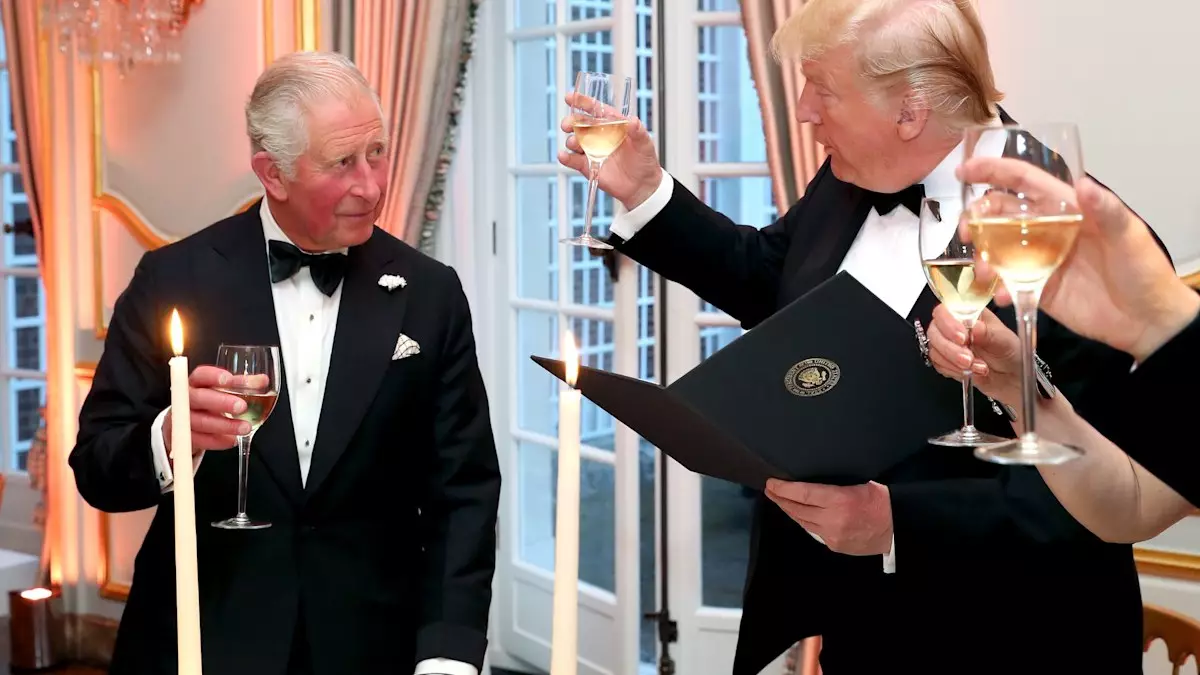Recently, former President Donald Trump announced the highly anticipated details of his second state visit to the UK, emphasizing the unprecedented nature of such an event. Speaking from the Oval Office, he disclosed that he had been personally invited by King Charles, a gesture that symbolizes not only diplomatic camaraderie but also the unique circumstances surrounding his presidency. Trump’s statement, referring to the visit as a “fest,” underscored the special honor and significance of this invitation, given that traditionally, second-term Presidents do not receive state visits.
Tradition dictates that these grand ceremonies primarily occur for sitting Presidents, yet Trump finds himself breaking the mold, claiming this visit is “the first time it’s ever happened to one person.” This only highlights the unusual dynamics at play: Trump’s non-consecutive terms place him in a rare category among U.S. leaders. The very act of receiving this honor is indicative of the peculiar yet robust bond currently shared between the U.S. and the UK.
Strengthening Diplomatic Ties
The invitation, presented to Trump by UK Prime Minister Sir Keir Starmer in early 2025, represents more than just a ceremonial engagement; it is a strategic move to bolster national interests and fortify existing alliances. Starmer pointed out that this unprecedented invitation symbolizes the strength of the relationship between the two nations, a sentiment echoed by various diplomatic analysts. This visit is not merely about royal pageantry; it forms part of a broader strategy to enhance transatlantic relations in a world that remains fraught with geopolitical uncertainty.
In this context, Trump’s relationship with King Charles is emblematic of personal diplomacy—a tool that is becoming increasingly vital in international relations. Trump’s expressed respect for the royal family demonstrates how personal connections can transcend normal diplomatic protocol, suggesting that softer elements are at play in U.S.-UK relations.
A Reflection on Historical Context
When we consider Trump’s first state visit in 2019 alongside the late Queen Elizabeth II, it is essential to recognize the historical significance of such interactions for both nations. During his initial trip, Trump was greeted with traditional British pomp and circumstance, yet the context and challenges of the current global climate demand a reassessment of such visits. The significance of establishing alliances—whether through state visits or geopolitical agreements—cannot be understated.
Both visits, while ceremonial, serve practical purposes: they are opportunities for leaders to convene and discuss shared interests, thereby consolidating alliances that might otherwise be strained. Whereas the first visit was marked by royal charm, the upcoming trip could leverage new fronts in trade, technology, and international security, particularly as global dynamics shift.
The Royal Family and Political Narrative
Trump’s fondness for the British royal family has frequently surfaced during his public engagements. Notably, his private meeting with Prince William in December 2024 highlighted what he characterized as “warm and fond memories” of Queen Elizabeth. Such interactions contribute to a larger narrative where personal sentiments collide with public duties, influencing perceptions on both sides of the Atlantic.
Trump’s references to his discussions with Prince William, concerning family challenges and personal well-being, reinforce the idea of modern leadership that intertwines personal circumstances with public collaboration. This melding of personal rapport and diplomatic discussions adds layers of depth to traditional statecraft, illustrating how personal relationships can have tangible implications in policy-making.
Setting the Stage for a New Era
As preparations for the State Visit unfold, anticipation mounts around how this historic encounter will set the tone for future engagements. As diplomatic protocols and global concerns evolve, the importance of this singular event is heightened. It may very well be more than just a state visit; it represents a pivotal turning point in U.S.-UK relations that could steer course for years to come.
Though tradition often dictates the bounds of state visits, Trump’s second invitation stands as a challenge to conventions, poised to influence future engagements. Whether celebrated or critiqued, the implications of such meetings are profound, emphasizing the power of effective diplomacy even amidst turbulent political landscapes. As we observe this unfolding narrative, it becomes clear that the bonds between the United States and the United Kingdom are evolving, shaped by history, personal connections, and ever-changing global dynamics.

